Yexin Li
Grad2Reward: From Sparse Judgment to Dense Rewards for Improving Open-Ended LLM Reasoning
Feb 02, 2026Abstract:Reinforcement Learning with Verifiable Rewards (RLVR) has catalyzed significant breakthroughs in complex LLM reasoning within verifiable domains, such as mathematics and programming. Recent efforts have sought to extend this paradigm to open-ended tasks by employing LLMs-as-a-Judge to provide sequence-level rewards for policy optimization. However, these rewards are inherently sparse, failing to provide the fine-grained supervision necessary for generating complex, long-form trajectories. Furthermore, current work treats the Judge as a black-box oracle, discarding the rich intermediate feedback signals encoded in it. To address these limitations, we introduce Grad2Reward, a novel framework that extracts dense process rewards directly from the Judge's model inference process via a single backward pass. By leveraging gradient-based attribution, Grad2Reward enables precise token-level credit assignment, substantially enhancing training efficiency and reasoning quality. Additionally, Grad2Reward introduces a self-judging mechanism, allowing the policy to improve through its own evaluative signals without training specialized reward models or reliance on superior external Judges. The experiments demonstrate that policies optimized with Grad2Reward achieve outstanding performance across diverse open-ended tasks, affirming its effectiveness and broad generalizability.
Linking Process to Outcome: Conditional Reward Modeling for LLM Reasoning
Sep 30, 2025Abstract:Process Reward Models (PRMs) have emerged as a promising approach to enhance the reasoning capabilities of large language models (LLMs) by guiding their step-by-step reasoning toward a final answer. However, existing PRMs either treat each reasoning step in isolation, failing to capture inter-step dependencies, or struggle to align process rewards with the final outcome. Consequently, the reward signal fails to respect temporal causality in sequential reasoning and faces ambiguous credit assignment. These limitations make downstream models vulnerable to reward hacking and lead to suboptimal performance. In this work, we propose Conditional Reward Modeling (CRM) that frames LLM reasoning as a temporal process leading to a correct answer. The reward of each reasoning step is not only conditioned on the preceding steps but also explicitly linked to the final outcome of the reasoning trajectory. By enforcing conditional probability rules, our design captures the causal relationships among reasoning steps, with the link to the outcome allowing precise attribution of each intermediate step, thereby resolving credit assignment ambiguity. Further, through this consistent probabilistic modeling, the rewards produced by CRM enable more reliable cross-sample comparison. Experiments across Best-of-N sampling, beam search and reinforcement learning demonstrate that CRM consistently outperforms existing reward models, offering a principled framework for enhancing LLM reasoning. In particular, CRM is more robust to reward hacking and delivers stable downstream improvements without relying on verifiable rewards derived from ground truth.
Learning to Select In-Context Demonstration Preferred by Large Language Model
May 26, 2025Abstract:In-context learning (ICL) enables large language models (LLMs) to adapt to new tasks during inference using only a few demonstrations. However, ICL performance is highly dependent on the selection of these demonstrations. Recent work explores retrieval-based methods for selecting query-specific demonstrations, but these approaches often rely on surrogate objectives such as metric learning, failing to directly optimize ICL performance. Consequently, they struggle to identify truly beneficial demonstrations. Moreover, their discriminative retrieval paradigm is ineffective when the candidate pool lacks sufficient high-quality demonstrations. To address these challenges, we propose GenICL, a novel generative preference learning framework that leverages LLM feedback to directly optimize demonstration selection for ICL. Experiments on 19 datasets across 11 task categories demonstrate that GenICL achieves superior performance than existing methods in selecting the most effective demonstrations, leading to better ICL performance.
Causal Graph Guided Steering of LLM Values via Prompts and Sparse Autoencoders
Dec 31, 2024Abstract:As large language models (LLMs) become increasingly integrated into critical applications, aligning their behavior with human values presents significant challenges. Current methods, such as Reinforcement Learning from Human Feedback (RLHF), often focus on a limited set of values and can be resource-intensive. Furthermore, the correlation between values has been largely overlooked and remains underutilized. Our framework addresses this limitation by mining a causal graph that elucidates the implicit relationships among various values within the LLMs. Leveraging the causal graph, we implement two lightweight mechanisms for value steering: prompt template steering and Sparse Autoencoder feature steering, and analyze the effects of altering one value dimension on others. Extensive experiments conducted on Gemma-2B-IT and Llama3-8B-IT demonstrate the effectiveness and controllability of our steering methods.
DWCL: Dual-Weighted Contrastive Learning for Multi-View Clustering
Nov 26, 2024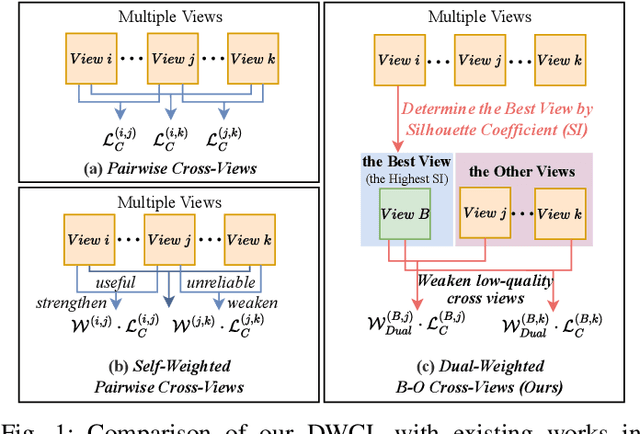
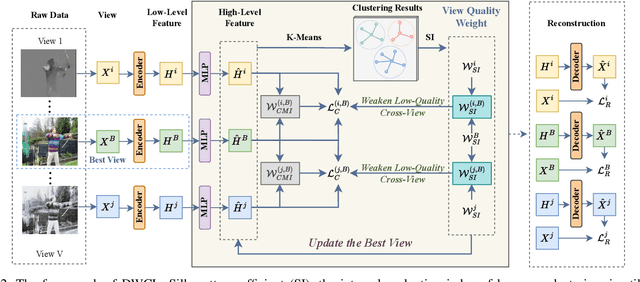
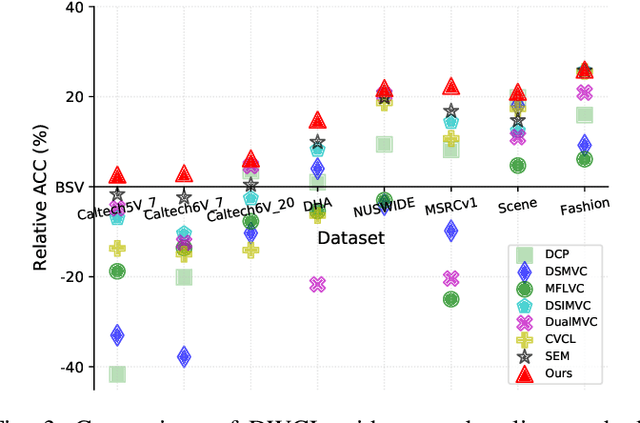

Abstract:Multi-view contrastive clustering (MVCC) has gained significant attention for generating consistent clustering structures from multiple views through contrastive learning. However, most existing MVCC methods create cross-views by combining any two views, leading to a high volume of unreliable pairs. Furthermore, these approaches often overlook discrepancies in multi-view representations, resulting in representation degeneration. To address these challenges, we introduce a novel model called Dual-Weighted Contrastive Learning (DWCL) for Multi-View Clustering. Specifically, to reduce the impact of unreliable cross-views, we introduce an innovative Best-Other (B-O) contrastive mechanism that enhances the representation of individual views at a low computational cost. Furthermore, we develop a dual weighting strategy that combines a view quality weight, reflecting the quality of each view, with a view discrepancy weight. This approach effectively mitigates representation degeneration by downplaying cross-views that are both low in quality and high in discrepancy. We theoretically validate the efficiency of the B-O contrastive mechanism and the effectiveness of the dual weighting strategy. Extensive experiments demonstrate that DWCL outperforms previous methods across eight multi-view datasets, showcasing superior performance and robustness in MVCC. Specifically, our method achieves absolute accuracy improvements of 5.4\% and 5.6\% compared to state-of-the-art methods on the Caltech6V7 and MSRCv1 datasets, respectively.
A Contextual Combinatorial Bandit Approach to Negotiation
Jun 30, 2024



Abstract:Learning effective negotiation strategies poses two key challenges: the exploration-exploitation dilemma and dealing with large action spaces. However, there is an absence of learning-based approaches that effectively address these challenges in negotiation. This paper introduces a comprehensive formulation to tackle various negotiation problems. Our approach leverages contextual combinatorial multi-armed bandits, with the bandits resolving the exploration-exploitation dilemma, and the combinatorial nature handles large action spaces. Building upon this formulation, we introduce NegUCB, a novel method that also handles common issues such as partial observations and complex reward functions in negotiation. NegUCB is contextual and tailored for full-bandit feedback without constraints on the reward functions. Under mild assumptions, it ensures a sub-linear regret upper bound. Experiments conducted on three negotiation tasks demonstrate the superiority of our approach.
CivRealm: A Learning and Reasoning Odyssey in Civilization for Decision-Making Agents
Jan 19, 2024



Abstract:The generalization of decision-making agents encompasses two fundamental elements: learning from past experiences and reasoning in novel contexts. However, the predominant emphasis in most interactive environments is on learning, often at the expense of complexity in reasoning. In this paper, we introduce CivRealm, an environment inspired by the Civilization game. Civilization's profound alignment with human history and society necessitates sophisticated learning, while its ever-changing situations demand strong reasoning to generalize. Particularly, CivRealm sets up an imperfect-information general-sum game with a changing number of players; it presents a plethora of complex features, challenging the agent to deal with open-ended stochastic environments that require diplomacy and negotiation skills. Within CivRealm, we provide interfaces for two typical agent types: tensor-based agents that focus on learning, and language-based agents that emphasize reasoning. To catalyze further research, we present initial results for both paradigms. The canonical RL-based agents exhibit reasonable performance in mini-games, whereas both RL- and LLM-based agents struggle to make substantial progress in the full game. Overall, CivRealm stands as a unique learning and reasoning challenge for decision-making agents. The code is available at https://github.com/bigai-ai/civrealm.
Crowd-sensing Enhanced Parking Patrol using Sharing Bikes' Trajectories
Oct 29, 2021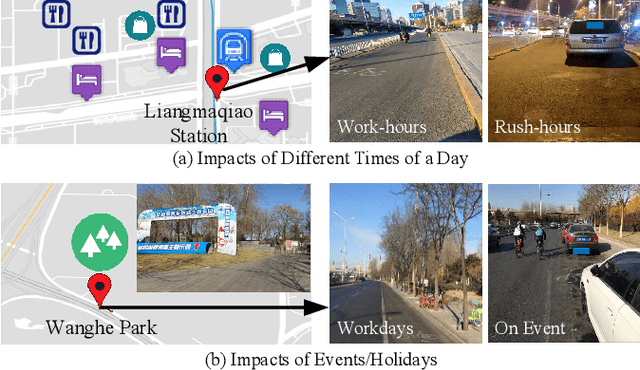
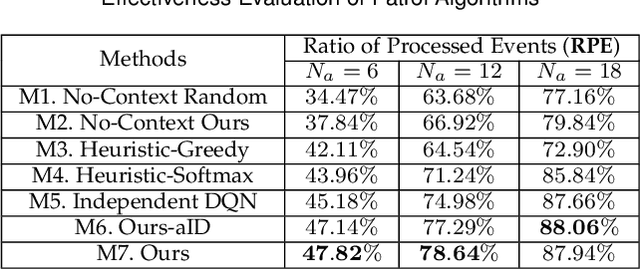
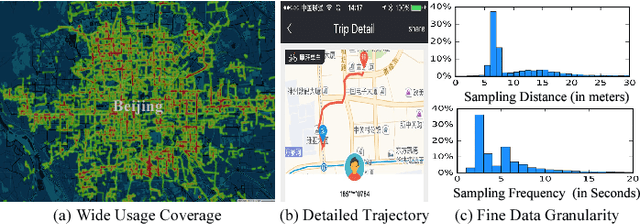

Abstract:Illegal vehicle parking is a common urban problem faced by major cities in the world, as it incurs traffic jams, which lead to air pollution and traffic accidents. The government highly relies on active human efforts to detect illegal parking events. However, such an approach is extremely ineffective to cover a large city since the police have to patrol over the entire city roads. The massive and high-quality sharing bike trajectories from Mobike offer us a unique opportunity to design a ubiquitous illegal parking detection approach, as most of the illegal parking events happen at curbsides and have significant impact on the bike users. The detection result can guide the patrol schedule, i.e. send the patrol policemen to the region with higher illegal parking risks, and further improve the patrol efficiency. Inspired by this idea, three main components are employed in the proposed framework: 1)~{\em trajectory pre-processing}, which filters outlier GPS points, performs map-matching, and builds trajectory indexes; 2)~{\em illegal parking detection}, which models the normal trajectories, extracts features from the evaluation trajectories, and utilizes a distribution test-based method to discover the illegal parking events; and 3)~{\em patrol scheduling}, which leverages the detection result as reference context, and models the scheduling task as a multi-agent reinforcement learning problem to guide the patrol police. Finally, extensive experiments are presented to validate the effectiveness of illegal parking detection, as well as the improvement of patrol efficiency.
POI Alias Discovery in Delivery Addresses using User Locations
Sep 20, 2021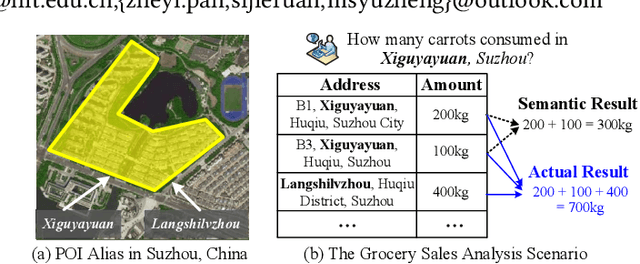
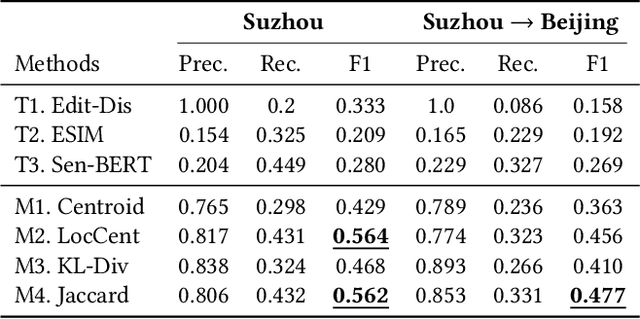
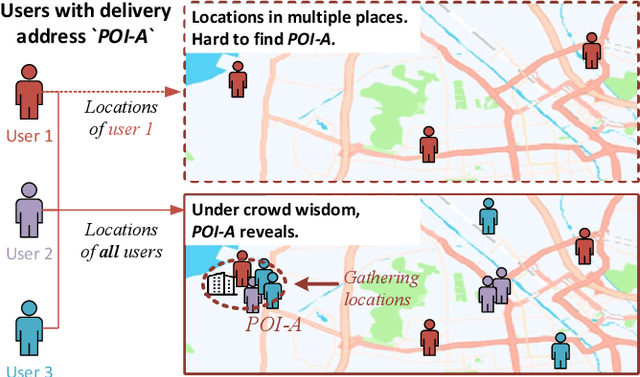
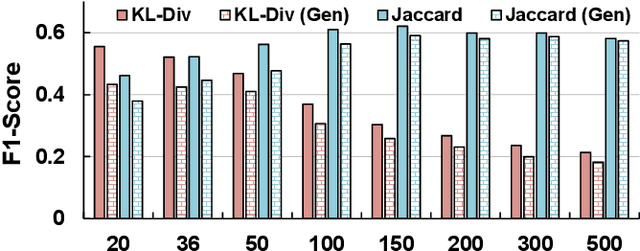
Abstract:People often refer to a place of interest (POI) by an alias. In e-commerce scenarios, the POI alias problem affects the quality of the delivery address of online orders, bringing substantial challenges to intelligent logistics systems and market decision-making. Labeling the aliases of POIs involves heavy human labor, which is inefficient and expensive. Inspired by the observation that the users' GPS locations are highly related to their delivery address, we propose a ubiquitous alias discovery framework. Firstly, for each POI name in delivery addresses, the location data of its associated users, namely Mobility Profile are extracted. Then, we identify the alias relationship by modeling the similarity of mobility profiles. Comprehensive experiments on the large-scale location data and delivery address data from JD logistics validate the effectiveness.
CityNet: A Multi-city Multi-modal Dataset for Smart City Applications
Jun 30, 2021

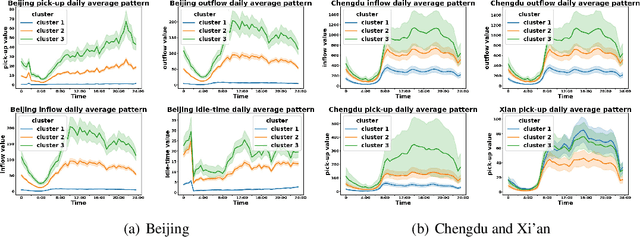
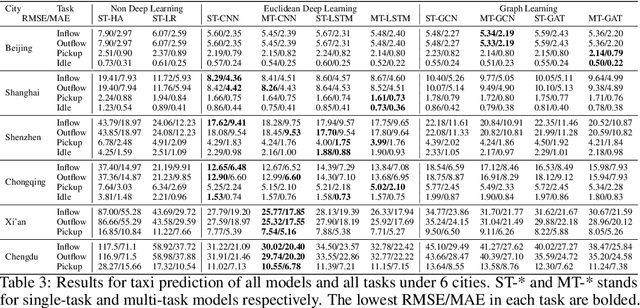
Abstract:Data-driven approaches have been applied to many problems in urban computing. However, in the research community, such approaches are commonly studied under data from limited sources, and are thus unable to characterize the complexity of urban data coming from multiple entities and the correlations among them. Consequently, an inclusive and multifaceted dataset is necessary to facilitate more extensive studies on urban computing. In this paper, we present CityNet, a multi-modal urban dataset containing data from 7 cities, each of which coming from 3 data sources. We first present the generation process of CityNet as well as its basic properties. In addition, to facilitate the use of CityNet, we carry out extensive machine learning experiments, including spatio-temporal predictions, transfer learning, and reinforcement learning. The experimental results not only provide benchmarks for a wide range of tasks and methods, but also uncover internal correlations among cities and tasks within CityNet that, with adequate leverage, can improve performances on various tasks. With the benchmarking results and the correlations uncovered, we believe that CityNet can contribute to the field of urban computing by supporting research on many advanced topics.
 Add to Chrome
Add to Chrome Add to Firefox
Add to Firefox Add to Edge
Add to Edge